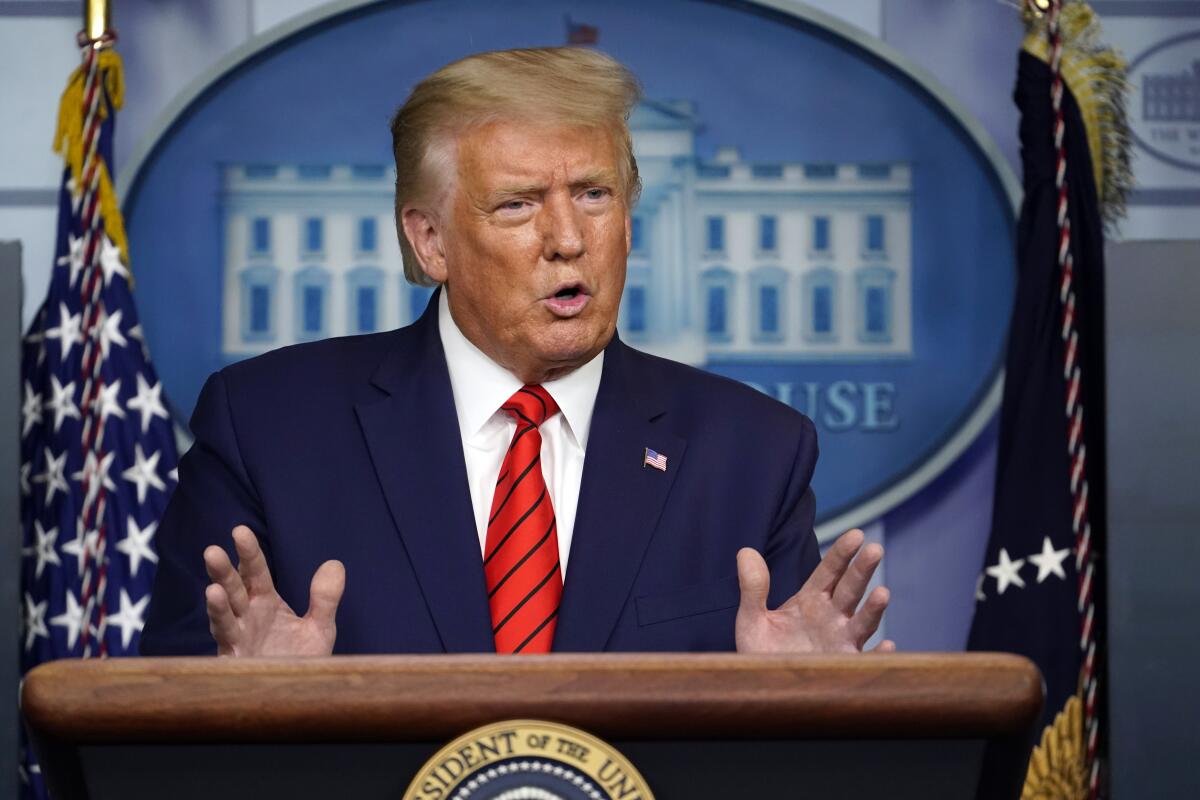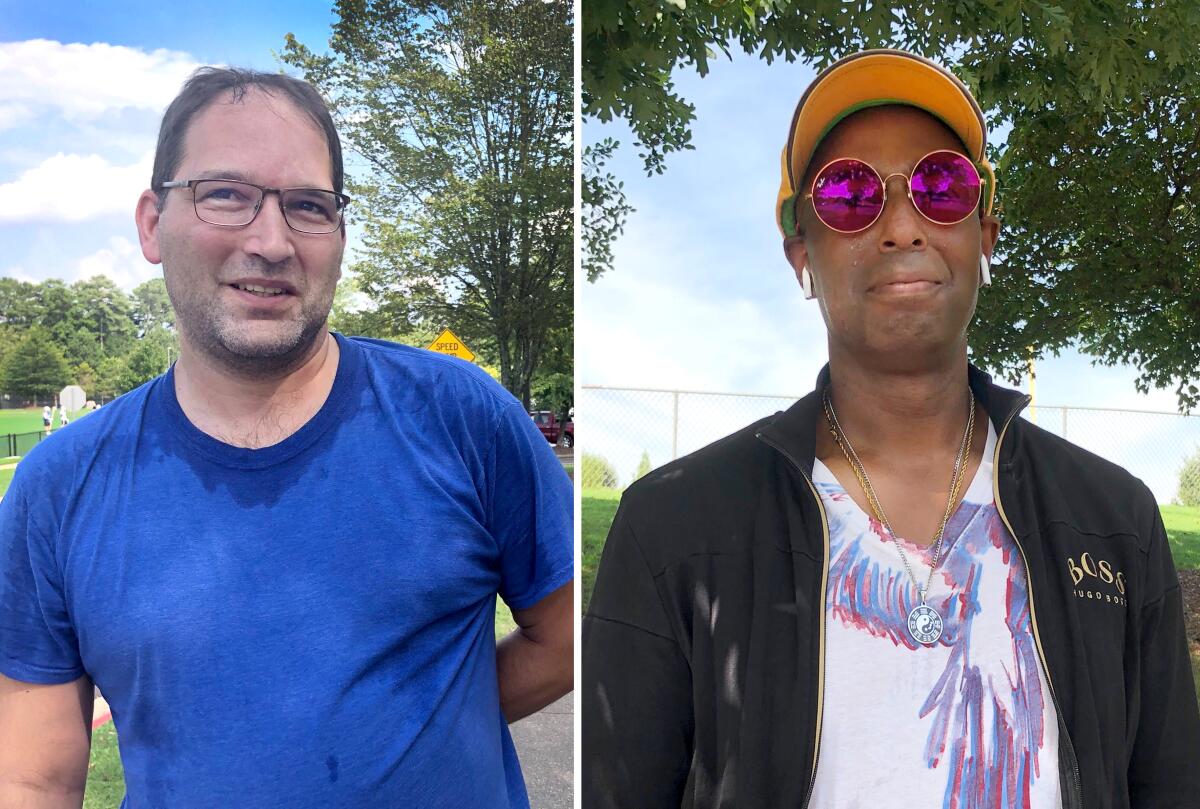‘He’s just fanning the flames.’ Trump’s vow to protect suburbs rings hollow in one

- Share via
JOHNS CREEK, Ga. — Gaby Anderson moved to this upscale bedroom community north of Atlanta eight years ago, drawn by its suburban amenities: robust public schools, lavish homes and sleepy cul-de-sacs.
But as an undecided voter, the 50-year-old manager of a healthcare practice is skeptical of President Trump’s dire warnings that Democrats will “demolish the suburbs” and that only he can protect their way of life.
As Trump tries to woo what he calls the “suburban housewives of America,” Anderson says he is stereotyping suburban women and harking back to a bygone era.
“I picture in my head Dick Van Dyke’s wife… a white woman in an apron,” she said. “I’m white and I live in the suburbs, but I don’t feel like I’m this suburban housewife terrified of everything going on around me.”
While Anderson isn’t yet sold on Democratic nominee Joe Biden, she thinks Trump’s hardline approach to the protests roiling Kenosha, Wis., Portland, Ore., and other cities ignores their root cause: police violence, systemic racism and lack of investment in inner-city schools.
“At this point, with all of the unrest, there’s a part of me that feels like if we vote for Biden, then the country would calm down a little bit,” she said. “If Trump wins again, all hell’s gonna break loose.”
Suburbs are always a battleground in presidential races. This year, Trump is targeting suburban voters with a racially charged tough-on-crime message that contends urban unrest over police shootings of Black men — which has led to violence in some communities — could endanger quiet communities like Johns Creek.

But Trump’s message risks alienating some who live in the nation’s suburbs, home to 175 million Americans and a diverse range of ethnicities and political views.
“There’s no homogenous suburb,” said Deirdre Oakley, a Georgia State University professor who specializes in urban geography and neighborhood change.
For decades, Johns Creek was staunch Republican territory, represented in Congress from 1979 to 1999 by Newt Gingrich, who served his last four years as House speaker. Trump won it by just 1% in 2016, but the district flipped in 2018, ousting a Republican incumbent and electing Democrat Lucy McBath.
The political change followed a demographic shift: The 84,000 inhabitants of Johns Creek are 53% white, down from 63% a decade ago. More than a quarter of the population is Asian, 11% are Black and 7% Latino. About a third of the residents are foreign born.
“Republicans are trying to revitalize a vision of America, or suburbia, that is from the 1950s,” said Angelika Kausche, a German-born Democratic state legislator who lives in Johns Creek and is running for reelection. “They’re appealing to a constituency that is no longer there.”
Women in suburbia increasingly have college degrees and work in science, medicine or technology. But stirring fears about urban unrest could resonate with Asian residents, Kausche said.
The Republican challenging Kausche this year, for example, is Jay Lin, a Taiwan-born businessman. He pledges to keep Johns Creek safe and never allow the defunding of law enforcement, as some protesters have demanded.
Siraj Ali, 55, an Indian immigrant who co-owns a gas station, said he will vote for Trump because he fostered economy growth and lowered taxes before the pandemic hit.
“He’s doing good for our country,” Ali said during an evening stroll. “We need him in charge for another four years.”
Atlanta’s suburbs in the 1950s and 1960s were overwhelmingly white, in part due to discriminatory housing practices. They diversified as Black people moved out of Atlanta or returned from northern cities, and as immigrants — especially Asians — moved in.
The signs are everywhere. A tiny Hindu temple is nestled near a Presbyterian megachurch. A local park boasts cricket batting cages. Strip malls offer Indian paneer bhurji, hot boiled beef with numbing Sichuan pepper, Thai rolled ice cream and bubble teas.
As Republican power cedes, many residents say they are less worried about urban crime than about healthcare, jobs and schooling amid a raging pandemic that already has killed more than 186,000 Americans.
“It seems like we’re living through end times, and he’s just fanning the flames,” Michael Andretta, 49, a logistical coordinator, said of Trump.
Andretta did not vote in 2016, but he plans to vote for Biden this year. Furloughed in the coronavirus lockdown, he worries how he will pay his rent and how the nation will rebuild its economy.
Andretta is not blasé about the violence that occurred 25 miles away in Atlanta — he and his girlfriend decided not to venture downtown to visit the Georgia Aquarium recently because they didn’t want to get caught in a protest — but he views Trump as an agent of chaos rather than a voice of calm.
“He’s not helping at all,” he said. “He’s embracing the divisiveness.”
To be sure, Trump’s message on law and order strikes a chord with some Johns Creek residents.
“It’s a horrible business, all this breaking and smashing and burning,” said Brenda Roger, who was born in South Africa and has lived here for nearly four decades. She identified herself as liberal — unlike her husband, who has long voted Republican — until she voted for Trump in 2016.
“If Trump’s message is not resonating,” she said, “I would be shocked.”
Becky Shaw, 41, a white stay-at-home mom with four kids, said she expects to vote for Trump again because he kept his promises to boost the economy and clamp down on immigration.
After George Floyd died in police custody in Minneapolis on May 25, she felt unsettled when protesters in downtown Atlanta smashed windows at the CNN Center and set police cruisers on fire.
The next day, stores in a shopping center near Johns Creek shut early when social media spread rumors that violent protesters would descend on the area. There were no protests that day, and the handful of Black Lives Matter protests in Johns Creek have all been peaceful.
But in June, a Wendy’s restaurant in south Atlanta was set alight after police fatally shot a 27-year-old Black man, Rayshard Brooks. Before long, protesters occupied the charred site, police ceded the area to Black men with guns, and there were threats on journalists, assaults and shootings — one of which killed an 8-year-old Black girl.
“It’s scary,” Shaw said. “There’s no rhyme or reason to it.”
Even if Trump does not explicitly mention white suburbanites or Black city dwellers, many here perceive his rhetoric as drawing on familiar racist tropes. Trump’s law-and-order message is a throwback, they say, Richard Nixon’s warning in his 1968 campaign that a “city jungle” would “annex affluent suburbs.”
Brian Sams, 50, a Black small-business owner who plans to vote for Biden, said he believes Trump is using coded language to speak to white residents, reassuring them he would preserve the racial and economic status quo.
“I think the bottom line is they want to keep the power,” he said. “So Trump may say all these racist or sexist things, but they’ll just overlook that because they think he will protect their power and their wealth.”
Local Republicans say the desire for public safety and concern about protests spiraling out of control has nothing to do with racism.
“Who’s pointing to a particular race?” said Liz Hausmann, a white Republican and Fulton County commissioner who lives in Johns Creek. “I think everybody wants to return to a safe community. I don’t know how in the world that can be interpreted negatively.”
Still, many white voters in Johns Creek interpret Republican messaging as racist and devoid of compassion.
“You can’t call it a dog whistle; it’s a bullhorn,” said Craig Besant, 53, a digital marketer who voted for Hillary Clinton in 2016. “If you’re worried about violence, why vote for the most divisive president in American history?”
More to Read
Get the L.A. Times Politics newsletter
Deeply reported insights into legislation, politics and policy from Sacramento, Washington and beyond. In your inbox twice per week.
You may occasionally receive promotional content from the Los Angeles Times.











